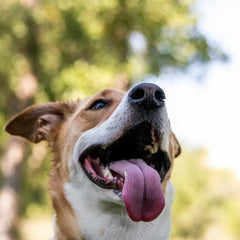As your loyal companion enters their golden years, they may begin to show signs of ageing, one of which is arthritis. Arthritis can greatly affect your dog's quality of life, but with proper management, you can help them stay as comfortable as possible. This comprehensive guide aims to shed light on managing arthritis in older dogs.
What is Canine Arthritis?
Arthritis is an inflammatory condition that affects one or multiple joints in dogs. While it is commonly associated with ageing, it can also be a result of injuries, genetics, or wear and tear on the joints.
Types of Canine Arthritis:
- Osteoarthritis: The most common form, often due to ageing or previous injuries.
- Rheumatoid Arthritis: An autoimmune disease that can affect dogs, although it is less common.
- Septic Arthritis: Caused by a bacterial or fungal infection in the joint.
Table: Types of Canine Arthritis and Causes
Type of Arthritis |
Common Causes |
| Osteoarthritis | Ageing, injuries |
| Rheumatoid Arthritis | Autoimmune disorder |
| Septic Arthritis | Bacterial or fungal infection |
Symptoms and Diagnosis
Recognising the symptoms of arthritis is the first step in managing the condition.
Common Symptoms:
- Limping or favouring one leg
- Difficulty in getting up from a sitting or lying position
- Obvious pain or discomfort while moving
- Swelling around the joints
- Excessive panting or signs of pain
Diagnostic Methods:
- Physical Examination: Your vet will perform a thorough physical examination.
- X-rays: To get a visual of the affected joints.
- Blood Tests: To rule out other conditions that might be causing the symptoms.

Treatment Options
Once arthritis is diagnosed, various treatment options can be considered.
Medication:
- Non-Steroidal Anti-Inflammatory Drugs (NSAIDs): For pain and inflammation.
- Corticosteroids: For severe inflammation, usually short-term due to side effects.
- Joint Supplements: Like glucosamine and chondroitin, can support joint health.
Surgical Options:
- Joint Replacement: In extreme cases, replacing the joint can provide relief.
- Arthroscopy: A less invasive procedure to remove damaged tissue from the joint.
Alternative Therapies:
- Acupuncture: Some dogs find relief through acupuncture.
- Hydrotherapy: Allows for movement with less stress on the joints.
Pain Management
Managing your dog's pain is a critical aspect of dealing with arthritis.
Pain Management Strategies:
- Weight Management: Excess weight can exacerbate arthritis symptoms.
- Physical Therapy: Gentle exercises can keep joints flexible.
- Orthopaedic Beds: Provide extra support for sore joints.
Lifestyle Changes
Making certain lifestyle changes can make a significant difference in your dog's comfort levels.
Recommendations:
- Regular, Gentle Exercise: Helps to maintain joint flexibility.
- Nutritional Adjustments: Omega-3 fatty acids can help reduce inflammation.
- Environmental Changes: Ramps to replace stairs, non-slip mats, and other modifications can make movement easier.
FAQs
Q: Can a younger dog get arthritis?
A: Yes, while it's more common in older dogs, younger dogs can also develop arthritis due to injuries or genetic predispositions.
Q: How can I tell if my dog's arthritis medication is working?
A: You should notice increased mobility and reduced signs of pain. If not, consult your vet for alternative treatments.
Q: Can arthritis be cured in dogs?
A: Unfortunately, arthritis is generally a lifelong condition but can be managed effectively with the right treatments and lifestyle changes.
Conclusion
Managing arthritis in older dogs involves a multi-faceted approach that includes medication, lifestyle changes, and sometimes even surgical interventions. With the right strategies, you can help your aging companion live a more comfortable and joyful life. Always consult your vet for a tailored treatment plan that best suits your dog's needs.




